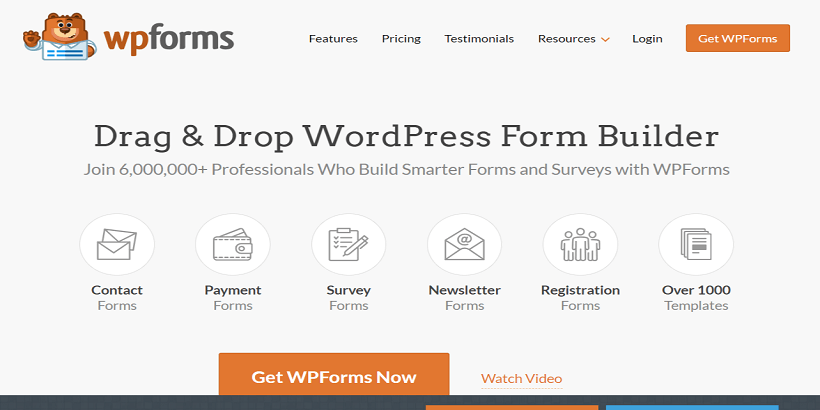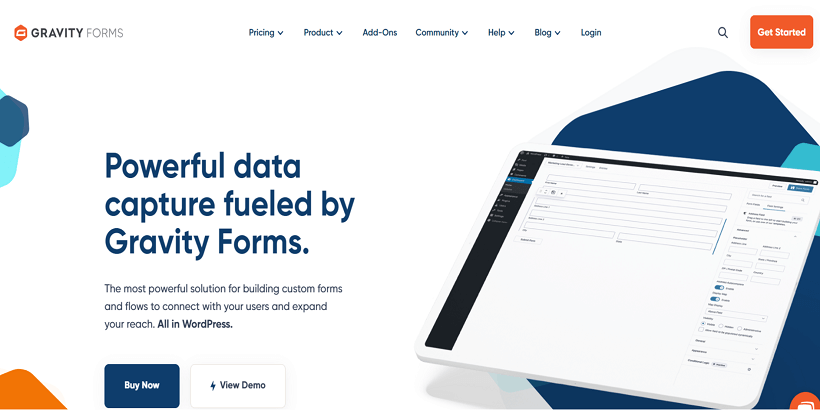If you are running a WordPress website and want to create forms for different purposes. Both of these plugins are excellent choices for adding forms to your websites, but they’ve their differences. In this article, we’ll compare WP Forms and Gravity Forms to help you decide which one is the better WordPress plugin for your specific requirements.
Understanding the Need for Forms
Forms play a vital role on websites. They allow site proprietors to interact with their visitors, gather information, and provide a means for users to get in touch or take specific actions. Whether you want a simple contact form, a checkup, an enrollment form, or indeed an advanced payment form, you need a trustable plugin to create and manage these forms.
Introduction to WP Forms

WP Forms, created by WPForms LLC, is a user-friendly drag-and-drop form builder plugin for WordPress. It’s known for its simplicity, making it an excellent choice for both freshers and experienced users. WP Forms offers a free version with limited features and a premium version with additional advanced functionalities.
Pros of WP Forms
User-Friendly Interface: WP Forms is designed with simplicity in mind. Its drag-and-drop builder makes it easy for anyone to create forms without any coding knowledge.
Pre-built Templates: The plugin offers a variety of pre-designed templates for common forms like contact forms, enrollment forms, audit forms, and more. This can save you time and effort.
Spam Protection: WP Forms includes assembled- spam protection with the use of reCAPTCHA and the Honeypot method to keep unwanted submissions at bay.
Integration with Email Marketing Services: WP Forms allows flawless integration with popular email marketing services like MailChimp, AWeber, and more.
Mobile Responsiveness: All forms created with WP Forms are mobile-responsive, ensuring they look and work well on any device.
Conditional Logic: With the premium version, you can use tentative reasoning to show or hide form fields based on user selections, making your forms more dynamic and user-friendly.
Payment Integration: WP Forms supports payments and integrates with PayPal and Stripe for simple e-commerce deals.
Cons of WP Forms
Limited Free Version: The free version of WP Forms has limited features, so you may need to buy the premium version for advanced functionalities.
Pricing: The premium version can be quite expensive for small website owners or bloggers.
Introduction to Gravity Forms

Gravity Forms, developed by Rocketgenius, is another popular form builder plugin for WordPress. It’s known for its adaptability and extensive features, making it a top choice for businesses and innovators. Unlike WP Forms, Gravity Forms is a premium-only plugin, which means you need to buy a license to use it.
Pros of Gravity Forms
High Customization: Gravity Forms is incredibly flexible and allows for deep customization of forms. You can create complex forms with conditional reason, pricing fields, and multi-page forms.
Integration Options: It offers a wide range of integrations with third-party services, CRMs, and payment gateways.
Developer-Friendly: Gravity Forms is a favorite among developers due to its extensibility. You can bring on custom add-ons and use hooks and filters to modify the functionality.
User Support: The premium plugin comes with excellent customer support, including access to documentation and user forums.
Security: Gravity Forms has assembled security features to safeguard your forms from spam and malicious renditions.
Cons of Gravity Forms
Premium Only: The biggest disadvantage of Gravity Forms is that it’s not free. You will need to pay for a license, which can be a barrier for smaller websites.
Learning Curve: The high rank of customization and adaptability comes at the cost of a steeper learning curve, which might not be suitable for newcomers.
NoPre-built Templates Unlike WP Forms, Gravity Forms does not hand over pre-designed templates. You have to create forms from scrape or use third-party templates.
A Comparative Analysis
Now that we’ve introduced both WP Forms and Gravity Forms, let’s compare them in different aspects to help you decide which one is more suited for your WordPress website.
1. Ease of Use
Winner WP Forms
However, WP Forms is the better choice, If you are looking for a user-friendly solution to create forms rapidly and without any specialized expertise. Its drag-and-drop interface and pre-built templates make form creation a breeze. In contrast, Gravity Forms, with its high level of customization, can be overpowering for newcomers.
2. Pricing
Winner WP Forms( for budget-conscious users), Gravity Forms( for businesses)
WP Forms offers a free version with fundamental features, making it a good choice for those on a tight budget. However, if you want advanced features like conditional logic, payment integration, or email marketing integration, you will need to buy a premium license, which can be expensive. On the other hand, Gravity Forms is a premium-only plugin, which can be more expensive but offers a comprehensive set of features suitable for businesses and developers.
3. Customization
Winner graveness Forms
However, highly customized forms, Gravity Forms excels in this department, If you need complex. It allows you to bring on complex forms with conditional logic,multi-page forms, and more. Developers appreciate the extensibility and customization options Gravity Forms provides.
4. Pre-built Templates
Winner WP Forms
For users who want to get started quickly and fluently, WP Forms’pre-built templates are a valuable feature. It provides a variety of ready-made forms for common use cases, saving you time and effort. Gravity Forms, unfortunately, lacks this point.
5. Integration
Winner Gravity Forms
Gravity Forms offers a broader range of integrations with third-party services, CRMs, and payment gateways. However, Gravity Forms is better equipped to handle those needs, If you rely on third-party services to manage your business.
6. Security
Winner Both
Both WP Forms and Gravity Forms give built-in security features to safeguard your forms from spam and malicious renditions. They use CAPTCHA and other methods to ensure your forms are secure.
7. Support
Winner Gravity Forms
The premium version of Gravity Forms comes with excellent customer support, documentation, and user forums. While WP Forms offers support, it may not be as extensive as Gravity Forms.
8. Mobile Responsiveness
Winner Both
Both WP Forms and Gravity Forms create mobile-responsive forms, assuring a flawless user experience on all devices.
9. Developer-Friendly
Winner Gravity Forms
Developers who want deep customization and the capability to produce custom add-ons will find Gravity Forms to be more developer-friendly. It provides hooks, filters, and a well-documented API for extending its functionality.
10. Spam Protection
Winner Both
Both plugins offer robust spam protection features, so your forms will remain free from unwanted sessions.
Choosing the Right Plugin for You
The choice between WP Forms and Gravity Forms eventually depends on your specific requirements and circumstances. Here are some scenarios to help you make an informed decision
WP Forms is an excellent choice If you are a freshman or on a tight budget. Its free version allows you to produce fundamental forms, and you can upgrade as your requirements grow. WP Forms is the better option, If you want to get started quickly with pre-built templates. Its templates save you time and effort in form creation.
Gravity Forms is the way to go, If you require advanced features and customization and are willing to invest in a premium plugin. It’s ideal for businesses, developers, and anyone demanding complex forms. Gravity Forms provides a wider range of integrations, making it the better choice if you rely on third-party services or if you have specific integration requirements. Gravity Forms is the most developer-friendly option If you’re a developer looking for maximum control and customizability. You can create custom add-ons and modify their functionality to suit your requirements.
Conclusion
In the WP Forms vs. Gravity Forms battle, there’s no clear winner that suits every situation. Your choice should be based on your individual demands and budget. WP Forms excels in simplicity and ease of use, making it great for newcomers and those on a budget. Gravity Forms offers extensive features and high customization, making it ideal for businesses and developers who require advanced forms. Consider your requirements and priorities when deciding which plugin to use, and rest assured that both WP Forms and Gravity Forms are excellent options for adding forms to your WordPress website.
I hope you enjoyed reading this article!
Please check out our other recent article:
The post WPForms vs Gravity Form: Which one’s better? appeared first on Acme Themes Blog.


0 Commentaires